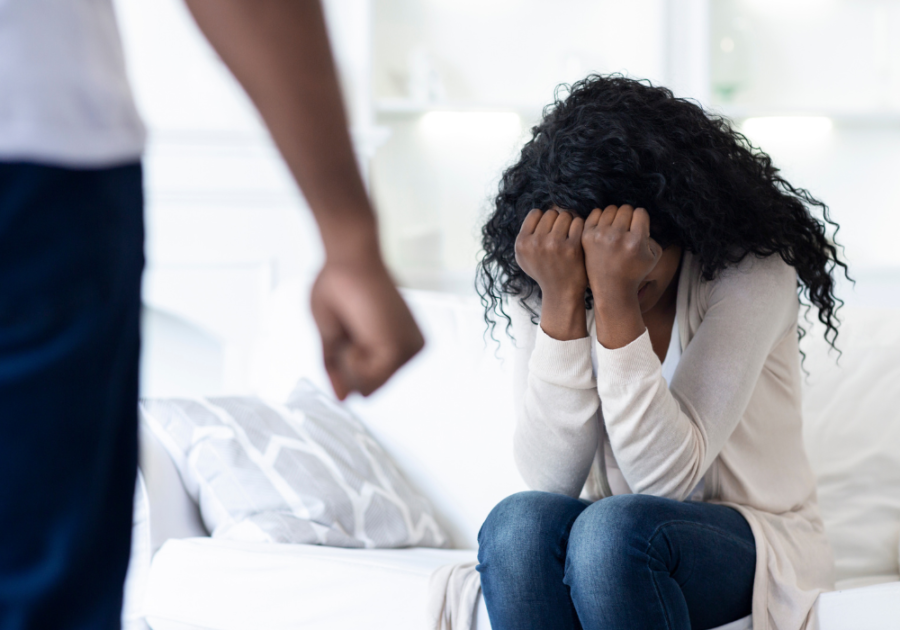We see you sitting there, asking a question no one should ever need to consider: “Is it normal for my boyfriend to hit me?”
Let's get one thing straight — love should never leave bruises.
It's a heart-wrenching question, and it might feel like you're alone, but you're not.
We're stepping into this tough conversation together, okay?
Let's unravel the twisted idea of ‘normal' and light the path towards a healthier, happier you.
Because you, darling, are worth so much more.
Is It Normal for My Boyfriend to Hit Me?
Let's tackle this head-on — absolutely, unequivocally, no.
It is not normal for your boyfriend, or anyone for that matter, to hit you.
Love isn't about fear, tears, or painful bruises. Love is about respect, understanding, and kindness.
It's about feeling safe and cherished, not living in constant apprehension. It's important you know this isn't what love should look like.

The numbers don't lie – according to the National Domestic Violence Hotline, nearly half of women in the U.S. have experienced some form of physical violence by an intimate partner in their lifetime.
This isn't a reflection of what's normal but rather a grave indication of how pervasive the problem is.
Here are some of the reasons why your boyfriend hitting you is not normal, acceptable, or legal.
Physical Abuse is a Violation of Trust
In the framework of a healthy relationship, trust is fundamental. It's the bedrock, the glue that binds two people together.
When your boyfriend chooses to express anger or frustration through physical harm, they're breaching that trust.
It's as if they're taking the sanctuary of your relationship, the bond you've built, and tearing it apart. It's important to remember that you deserve a partner who honors and respects the trust you've placed in them, not someone who shatters it without a second thought.
Love Does Not Equal Fear
A good boyfriend should be the person you can run to, not run from. They should be your rock, your safe harbor in the storm, not the source of your fear. When you're constantly on edge, afraid of what might happen if you say or do the wrong thing, that's not love.
Love should give you wings, make you feel cherished and secure, not clip your wings and keep you grounded in fear. You should be dreaming about tomorrow, not dreading it. Remember, fear is a prison, and love is the key, not the lock.
Abuse Isn't an Expression of Passion
There's a dangerous misconception that intense love or passion can justify aggressive behavior. But let's clear this up right now — it doesn't. Physical violence isn't a passionate outburst; it's a terrifying display of control, dominance, and disrespect.
The idea that someone would harm you in the name of love is a distorted reality designed to keep you bound in the chains of abuse. True passion fuels connection and understanding, not fear and bruises.
It Can Escalate Over Time
Unfortunately, abuse is often not a one-off event. More commonly, it's a devastating cycle that escalates, often beginning with emotional abuse and becoming more severe and frequent over time. What starts as a ‘one-time' slap can morph into regular beatings, leaving physical and emotional scars that run deep.
This dangerous spiral can lead to severe physical harm and long-lasting emotional trauma. It's a whirlwind that pulls you in, but it's crucial to understand that there's a way out, a chance for escape to a safer, healthier life.

Everyone Deserves Respect
Disagreements are part and parcel of any relationship. Differences of opinion can even be healthy, providing opportunities for growth and understanding. However, turning to violence during conflicts is a gross violation of the basic human right of respect.
You should be listened to, not silenced. You should be understood, not hurt. No matter what, everyone deserves to be treated with dignity and respect in a relationship. Never accept less.
Inexcusable Reasons Your Boyfriend Hits You
While it's essential to clarify that no reason justifies physical violence, it may be helpful to understand the underlying factors that can contribute to such abusive behavior.
Let's delve into the causes together.
A Misguided Understanding of Power and Control
Some men resort to physical violence in an attempt to establish power and control over their partners. It's a twisted form of domination rooted in insecurities, personal inadequacies, or even past failures.
They may believe that exerting physical control is a means to validate their authority or masculinity, a fallacy that harms their partner and the relationship itself.
Learned Behavior from Past Experiences
Physical violence can sometimes be a learned behavior, often a result of upbringing or past experiences.
If a person has witnessed or experienced domestic violence in their family or previous relationships, they may unknowingly perpetuate this cycle of abuse, wrongly accepting it as the norm.
Inability to Effectively Communicate
Sometimes, physical violence stems from a profound inability to express feelings or communicate effectively.
Instead of articulating their frustrations, worries, or anger, these men resort to physical aggression, treating violence as a hideous form of ‘communication.'
Substance Abuse
Substance abuse can often be a catalyst for violent behavior. Alcohol, drugs, or other substances can impair judgment, exacerbate aggression, and lead to loss of control.
While this doesn't excuse the behavior, it is, sadly, a common contributing factor.
Unresolved Psychological Issues
Various psychological issues, such as personality disorders or untreated mental health conditions like depression or bipolar disorder, can contribute to abusive behavior.
However, it's important to note that mental health problems are not a justification for violence, but they might be a part of the broader picture.
Insecurity and Perceived Threats to Masculinity
Men who engage in abusive behaviors often harbor deep-seated insecurities and anxieties about their self-worth or masculinity.
Any action by their partner that they perceive as threatening their manhood — such as challenging their decision-making or asserting independence — can provoke violent responses as a means to reassert their control and safeguard their fragile self-esteem.
Societal and Cultural Norms
Domestic violence is wrongly normalized or even justified in some societies or cultures. Men raised in such environments may adopt this erroneous belief, blurring the lines between right and wrong.
Fear of Abandonment or Rejection
Paradoxically, fear of abandonment or rejection can sometimes trigger violent behavior. In a misguided attempt to keep their partner ‘close,' some men resort to physical violence to assert control and prevent their partner from leaving.
No matter the reason, remember this: Violence is never a valid form of expression, control, or communication. It's a flagrant violation of your rights and dignity.
Understanding these reasons isn't about excusing the abuse but empowering you to recognize the signs and take the necessary steps toward safety and healing.
11 Actions To Take If Your Boyfriend Hits You
If you're trapped in the harsh reality of physical violence, it's crucial to remember that you're not alone.

It might feel like an insurmountable challenge, but trust us; there are practical steps you can take right now. Let's look at ten specific actions that can help safeguard your well-being and set you on the path to safety and healing.
1. Acknowledge the Situation
It's critical to acknowledge that what you're experiencing is physical abuse. Denial can be a powerful mechanism in such situations, but breaking through it is the first significant step. Remember, it's not your fault.
You're not responsible for your partner's abusive actions, and you deserve so much better. Trust your instincts and your feelings. If something doesn't feel right, it usually isn't.
2. Ensure Your Immediate Safety
If you're in a situation where your physical safety is at risk, it's essential to act quickly. If possible, leave the area where the violence is occurring. Call 911 or your local emergency number immediately.
Have an escape plan in place for times of immediate danger. This could involve knowing the quickest route out of your home, having a designated friend or relative's house you can escape to, or identifying a nearby public area where you can go.
3. Reach Out to Trusted Individuals
Abusers often try to isolate someone in order to keep them under control. Try to maintain contact with friends, family, or colleagues you trust and can rely on for support.
Let them know about your situation. Even if they can't offer practical help, their emotional support can be invaluable during this challenging time.
4. Contact a Domestic Violence Hotline
Reach out to a domestic violence hotline like the National Domestic Violence Hotline (1-800-799-7233 or text “START” to 88788). They're available around the clock and can provide crucial advice tailored to your situation.
They can also help connect you with local resources, such as emergency shelters, counseling services, and legal aid.
5. Document the Abuse
While ensuring your immediate safety is the priority, if it's possible and safe, try to document instances of physical abuse. This evidence can be instrumental if you choose to involve the police or apply for a protection order in the future.
You can document the abuse by taking pictures of your injuries, saving threatening text messages or emails, keeping a detailed journal of incidents, and seeking medical attention to create official records of your injuries.
6. Seek Legal Assistance
Find a lawyer who specializes in domestic violence cases. They can guide you through the process of filing a protective order, pressing charges, or navigating the family court system if children are involved.
If you're concerned about the costs, many non-profit organizations provide legal aid for domestic abuse victims.
7. Make a Safety Plan
A safety plan is a personalized, practical plan that includes ways to stay safe while in an abusive relationship, planning to leave, or after you leave.
It involves identifying safe areas in your home, teaching your children how to get help, having a secret code word with friends or family, packing an emergency bag, and having a plan for your pets. Many hotlines and domestic violence prevention organizations can help you craft this plan.
8. Seek Professional Counselling
Counseling can play a pivotal role in helping you process your experiences and begin healing. Therapists specialized in domestic violence can provide strategies for dealing with trauma, guide you towards understanding your worth, and help you rebuild your life after abuse.
Local women's centers and health clinics can usually provide counseling services or recommend a professional.
9. Report to the Police
If you are in immediate danger or have been physically hurt, don't hesitate to call the police. Even if you're not ready to press charges, filing a police report can document the abuse and may be helpful in the future if you choose to pursue legal action.
Remember, it's crucial to cooperate and provide as many details as possible about the incidents.
10. Seek Medical Attention
After an incident of physical violence, seeking medical attention as soon as possible is crucial, even if injuries seem minor. Medical professionals can properly assess and document your injuries, which can serve as important evidence if you choose to report the abuse later.
Your healthcare provider can also refer you to additional resources, such as counselors or support groups, to help you navigate this difficult time.
11. Trust Yourself
Finally, trust yourself. You are stronger than you know, and you have the power to change your situation. Trust your gut instincts, and remember that it's okay to prioritize your safety and happiness. It's a journey, and taking it one step at a time is okay.
More Related Articles
13 Signs Of A Verbally Abusive Husband And What You Can Do About It
Does He Have Hidden Rage? Unmasking 21 Signs Of Anger Issues in Men
11 Obnoxious Ways A Narcissist Reacts When They Can’t Control You
Why Have I Allowed My Boyfriend to Hit Me?
If you find yourself asking this question, it's crucial to first absolve yourself of any guilt or blame. Abusive behavior is never the victim's fault; it lies solely on the shoulders of the abuser. That being said, it's understandable that you might be wrestling with this question.
Let's take a moment to explore some reasons why you might have found yourself in this situation:
- Love and Hope: It's possible that your love for your partner, or hope that they'll change, has made you more tolerant of their abusive behavior. Believing in the good in people is a beautiful quality, but remember, real change can only come from them.
- Fear: Fear is a potent controller. Fear of retaliation, fear of being alone, or fear of the unknown can sometimes make us accept the unacceptable.
- Low Self-Esteem: If you've been routinely belittled or made to feel unworthy, it's possible that you've begun to believe that you deserve the abuse. Please understand – you don't. You deserve respect, kindness, and love.
- Normalization of Violence: If you've grown up in an environment where domestic violence was common, you might have unconsciously accepted it as normal. It's not.
It's brave of you to reflect on these reasons. Remember, understanding why doesn't mean accepting or justifying the situation. It's about empowering you to take the next step toward a life free from violence.
Final Thoughts
Ending this conversation here won't do it justice. It's just the beginning. The next steps are about you: understanding your worth, recognizing the abusive signs, and finding the help you need.
You are not alone. You are strong. And remember, you deserve better, and there's a community nearby, ready and willing to stand by you every step of the way.

